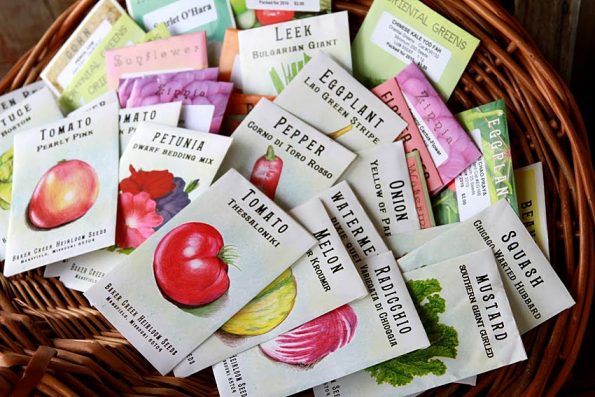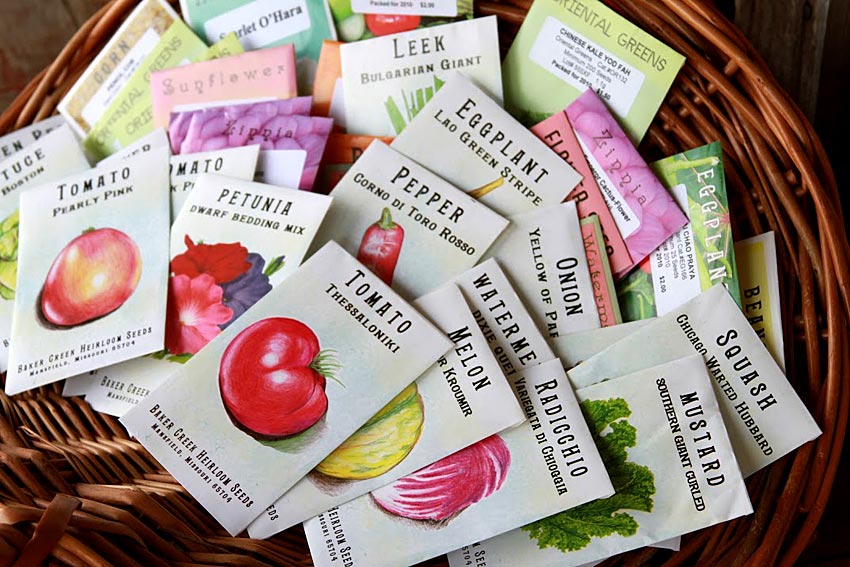 Starting your garden from seeds can be extremely satisfying and rewarding. With their transformative powers, tiny specks of potential life can grow into beautiful, vibrant plants. In addition, you have the opportunity to plant unique seed varieties not available at local grocers or big box garden stores. When choosing seeds, know that not all seeds are equal. But what should you look for on seeds packets?
Starting your garden from seeds can be extremely satisfying and rewarding. With their transformative powers, tiny specks of potential life can grow into beautiful, vibrant plants. In addition, you have the opportunity to plant unique seed varieties not available at local grocers or big box garden stores. When choosing seeds, know that not all seeds are equal. But what should you look for on seeds packets?
In discussing seeds, two terms often populate the conversation: Genetically Modified Organisms (GMO) and heirloom.
Heirloom seeds are varieties that have been unchanged as they have been passed down throughout generations of growing seasons. Heirlooms are open-pollinated, which means that the parent plants pollinate to produce seeds that are almost identical to the parents. Heirlooms are not hybrids, or varieties that have been cross-pollinated. Heirlooms are typically not used in large-scale modern agriculture, but are favored by artisanal and small farmers.
Heirloom plants often produce unique, colorful fruits and veggies such as purple carrots and gold tomatoes.
Lastly, there is a difference between organic and heirloom. Organic refers to the conditions in which the plants and seeds are grown, whereas heirloom refers to the pedigree of the plants and seeds.
Genetically Modified Organisms include GM seeds. According to the World Health Organization, GMOs are organisms in which the plant’s genetic makeup has been altered or transformed in a way that does not naturally occur. The species’ DNA has literally been changed. Most GMOs include cash crops such as soybean, corn and cotton. Often these seeds produce plants that are hardy, adaptable, highly productive, insect-resistant, and cheap. Although these qualities may seem desirable, debate and controversy surround GMO engineering.
Genetically Modified foods are considered safe for consumers; however, many feel that more long-term research is necessary before this claim can be made. There are also several environmental concerns to consider regarding GMOs including: effects on wild plant populations, the decrease of biodiversity, the increased use of chemicals in agriculture, and the loss of insects that are not pests. In addition, there are ethical questions regarding labeling GMOs on food packaging.
With large companies like Monsanto leading the way in Genetically Modified seed production, it is important to do research when choosing seeds to grow at home.
I recommend purchasing seeds from local premium seed distributor, Mountain Valley Seed Co. Their business reflects their ethics, and Mountain Valley Seed Co. will not sell GM seeds. Instead, they have committed to the Council for Responsible Genetics’ Safe Seed Pledge, which states their support for healthy, natural and diverse agriculture now and for future generations.
By choosing to plant heirlooms, you are not only adding unique variety to your garden, but also supporting an agricultural legacy.






